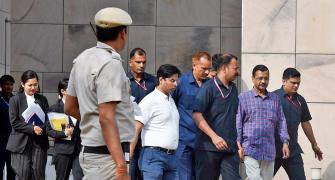If you thought that international cable television majors such as Liberty Media and Comcast Corporation will line up to invest in the Indian cable TV industry after the government's proposal to allow 74 per cent foreign equity in cable, think again.
The buzz is that the government is in a mood to raise the foreign equity bar for the cable industry from the current 49 per cent to 74 per cent.
But the cable industry majors are not uncorking the champagne just yet for the following reasons. For a start, they claim that foreign companies are chary of investing in India's highly fragmented and unregulated cable TV market.
"Who will invest in a sector which is so disorganised? Neither the identities of the cable TV customers nor the their actual numbers are known. Even the average revenue per user (ARPU), at about Rs 150 to Rs 175, is very low," remarks a Delhi-based media industry expert.
True. Cable industry insiders say that most MSOs (multi system operators) bleed since their local cable operators under-declare subscriber numbers hugely.
"In fact, MSOs get less from their cable operators than what they pay the broadcasters. The only revenue model that loosely exists for them is the carriage fee they now charge from the new channels," says a cable and DTH industry expert.
"Unless the cable industry is digitised and becomes addressable, foreign investment will be hard to come by," declares Jawahar Goel, vice-chairman of the Zee group which runs its cable business under WWIL.
"All these years, 49 per cent FDI was permitted in cable. How many foreign companies have you seen putting money into the Indian cable industry?" he asks. His argument is that raising the FDI limit does not change the ground realities of the Indian cable TV market.
For instance, even Star India which holds 26 per cent in Hathway cable has not exactly upped its stake to 49 per cent. In fact, last year it even diluted it marginally by about one or two per cent. A Star India spokesperson agrees that the cable business will not be attractive until it is regulated.
"That is not true," says Ashok Mansukhani, president, corporate affairs at Hinduja Ventures Ltd (formerly Hinduja TMT Ltd) that owns In Cable. The size of the market is attractive. There are 72 million cable homes but there are another 40 million TV homes which have no cable. "So the potential is huge," he says.
Also, the Rs 12,000 crore (Rs 120 billion) cable industry is growing at 15 per cent a year. That is not all. The 74 per cent equity allows investors management control in the company.
"And the Telecom Regulatory Authority of India (Trai) is attempting to regulate the industry better," he says.
To be sure, critics argue that cable would have attracted foreign investments if CAS (conditional access system which digitises cable TV homes and makes them addressable) had not been abandoned after its partial implementation in some metros.
"It was when CAS was being pushed by the government that the foreign companies were making inquiries," says a former WWIL executive.
But Mansukhani claims that even in the non-CAS regime, cable could attract serious foreign money if the government tightens regulatory control and makes under-declaration of subscribers and non payment of entertainment tax and service tax a criminal offence.
Mansukhani says that foreign investors have not lost interest in the Indian market. A point backed by Jagjit Singh Kohli, promoter of the new cable television company Digi Cable.
A foreign private equity fund has already picked up 49 per cent equity -- currently permissible under law -- in his cable company. "If it is raised to 74 per cent, we can get more money required for digitising the cable networks acquired under Digi Cable," he says.
The Indian cable industry could probably do with the foreign money though as digitising the 72 million cable homes would require a whopping Rs 10,000 crore (Rs 100 billion).








